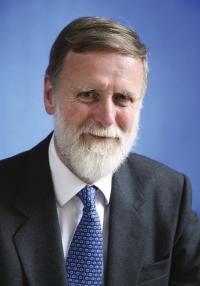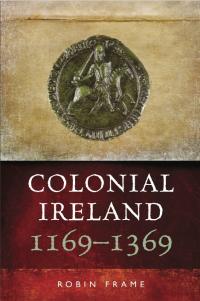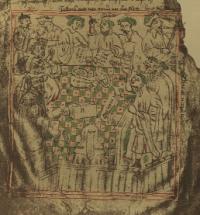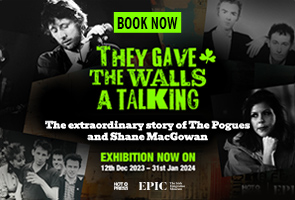‘Framing’ the Anglo-Norman invasion:Robin Frame on medieval Irish history and why it matters
Published in
Features,
Issue 3 (May/June 2012),
Medieval History (pre-1500),
Volume 20

Robin Frame—widely credited with having transformed our understanding of Ireland in the Middle Ages. (RIA)
In 1969 a 26-year-old Belfast boy with a distinguished undergraduate record applied for a lectureship at the University of Durham. Robin Frame was then at work on his doctoral dissertation in Trinity College, Dublin, and had one published article to his name. That might have been one article too many for H.S. Offler, then professor of medieval history at Durham, who did not approve of ‘young men rushing into print’! But Offler took a risk and gave Frame the job, along with some advice on how to progress in a field of research that must have seemed totally obscure: later medieval Ireland—‘Your job is to tell us about it’.And tell them he did. For over 40 years Frame has worked in England, where he has been immensely successful in communicating the significance of medieval Ireland to a wider audience. In the process he became one of a small band of medievalists to shift the ground under the edifice of English academic history. Today a historian who surveys the history of medieval England and ignores what was once called the ‘Celtic fringe’ (not only Ireland but also Scotland, Wales and the Isle of Man) risks appearing old-fashioned, if not downright myopic.Ask who is responsible for this paradigm shift (for once the term is not a cliché) and you will almost certainly hear two names. The first is Rees Davies, the great Welsh historian who died in 2005. The second is Robin Frame, who squirms at being bracketed as a practitioner of ‘British history’. ‘Rees used to say to me: “You know, there are these two dreadful ogres they go on about, one is me and the other is you!” But I was never an evangelist for it.’

Robin Frame MRIA was born in Belfast in 1943. He studied history in Trinity College, Dublin, as an under- and postgraduate between 1962 and 1970. In 1969 he was appointed to a lectureship at the University of Durham, where he became professor in 1992. His publications include English lordship in Ireland (1982) and The political development of the British Isles (1990). His textbook Colonial Ireland (1981) has recently been re-published by Four Courts Press in a new illustrated edition.
Frame may not have proselytised for a ‘British history’ approach but he has laboured to make medieval Ireland intelligible to outsiders. He regrets the tendency of Irish historians to address themselves to their own kind. ‘Why shouldn’t they?’, he adds hastily. ‘Every national historiography addresses its own problems. But sometimes the very vocabulary is eccentric to Ireland. We must beware of terms and assumptions that lock people out.’ We can unlock the subject, he says, both for ourselves and for others, by remembering that medieval Ireland makes sense in wider contexts, which might be European as much as (if not more than) British.Consider Frame’s textbook Colonial Ireland, 1169–1369, which has just been re-published 30 years after its first appearance in 1981. Frame was ahead of the trend in treating the Anglo-Norman invasion of Ireland in the twelfth century as ‘an episode of European history’—part of the expansion of Latin Christendom, which scattered Normans and Anglo-Normans and deposited them in locations as widely separated as Jerusalem and Jerpoint, Co. Kilkenny. He is gratified that the volume remains useful, but warns that vastly more has been published on the subject between 1981 and 2012 than appeared in the previous 100 years. Characteristically he is too modest. Colonial Ireland anticipated and often inspired the scholarship of the next three decades—which is why its interpretation remains so fresh in 2012.Colonial Ireland was written while Frame was developing a course for his Durham undergraduates that explored the histories of Ireland, Scotland and Wales in the high Middle Ages, ‘with England as the elephant in the room that affected everything!’ With the advent in the mid-1980s of a self-consciously ‘British’ history—which sought to tease out the comparisons, contrasts and connections between the various national and regional components of the archipelago—Frame felt like the man who was astonished to learn that he had been speaking in prose all his life.His contextual approach was imbibed during undergraduate days, when the redoubtable Jocelyn Otway-Ruthven (who appeared terribly ancient when Frame entered Trinity in 1962, although she was then only in her early 50s) gave compulsory lectures on what she considered to be the eternal verities of the English constitution, taught on the basis of Stubbs’s Select Charters—a nineteenth-century compendium of medieval documents in the original Latin. Alongside this high Victorian fare, Otway-Ruthven served up an innovative special subject on the ‘great liberties’ (that is, territories immune from royal jurisdiction) in Ireland, Wales and England. This was comparative ‘British’ history avant la lettre—although the Ot would never have seen it that way.

From an early fifteenth-century drawing of the Court of the Irish Exchequer in the ‘Red Book of the Irish Exchequer’ (destroyed in 1922). Together with the chancery and parliament, the exchequer was one of the institutional legacies bequeathed by the Middle Ages to modern Ireland.
Otway-Ruthven’s passion was for accuracy, for no shortcuts. Her formal, almost antiquarian, attitudes were complemented by the lively influence of James Lydon, who supervised Frame’s doctoral research. ‘Lydon’s great thing is the ability to enthuse and encourage. He was enormously stimulating. He could be the most scathing of critics, but he could also praise—which is much harder.’ Frame took Lydon’s course on Ireland 1377–1534. Astonishingly there was virtually nothing to read on much of this period in the mid-1960s. The only survey was Edmund Curtis’s History of medieval Ireland (second edition, 1938). Otway-Ruthven’s massive digest of the same name appeared in 1968. Lydon’s sparkling Lordship of Ireland in the Middle Ages was first published in 1971. In default of secondary reading, Lydon plunged his undergraduates straight into the original sources. ‘It was a fantastic course for anyone who was prepared to be serious about it.’The study of medieval Ireland has taken great strides since 1962, when Frame first encountered the subject he was to make his own. Still we have only begun to scratch the surface. Despite the archival cataclysm in 1922, the source material for the fourteenth and fifteenth centuries is rich. But even the best-known seams of evidence, such as the deeds of the Butlers of Ormond (available in translation since the 1930s), remain under-utilised. Every year more material becomes available, often with just a few clicks of the mouse. All this represents an opportunity: ‘I want to see existing assumptions unpicked’, Frame says.His particular bugbear is the tendency for the Middle Ages to be telescoped so that the decline of English power to the shrunken Pale of the early Tudors becomes an organising theme with a grip on the historical imagination as tenacious as the decline and fall of Rome. ‘The lordship of Ireland lasted from 1171 to 1541, the same length of time that separates Thomas Cromwell from Mr Gladstone or the end from the beginning of Roman Britain: it seems perverse to regard its first 150 years as an overture to preordained decline.’This is not a call to debunk for the sake of debunking. Rather Frame argues for three things. First, we must not explain away the period 1169–c. 1300—which witnessed one of the major episodes of conquest and colonisation, not just in the archipelago but in the medieval west—by presenting the Anglo-Norman invasion of Ireland as a doomed affair. Second, we need to achieve a nuanced and complex picture of the multi-ethnic melting pot that was late medieval Ireland (c. 1300–1500). Finally, the Middle Ages as a whole must be appreciated for the social, political and institutional legacy they bequeathed to modern Ireland, including the county system, the legal framework and a parliamentary tradition. What this amounts to is a thumping affirmation that medieval Irish history matters and needs to be rediscovered by a new generation. Innumerable subjects remain in search of an intrepid historian. And, as Frame notes, adopting the air of a recruiting agent, ‘the field is not exactly crowded’. HI
Peter Crooks is an IRCHSS-funded research fellow of Trinity College Dublin and the University of East Anglia.
Robin Frame’s lecture (open to the general public) ‘Rediscovering Medieval Ireland’ takes place on Thursday 10 May 2012 at 6pm in the Thomas Davis Lecture Theatre, Arts Building (Room 2043), Trinity College, Dublin. Enquiries: Peter Crooks, irish.chancery@gmail.com, +353 (0)1 8961791.



















